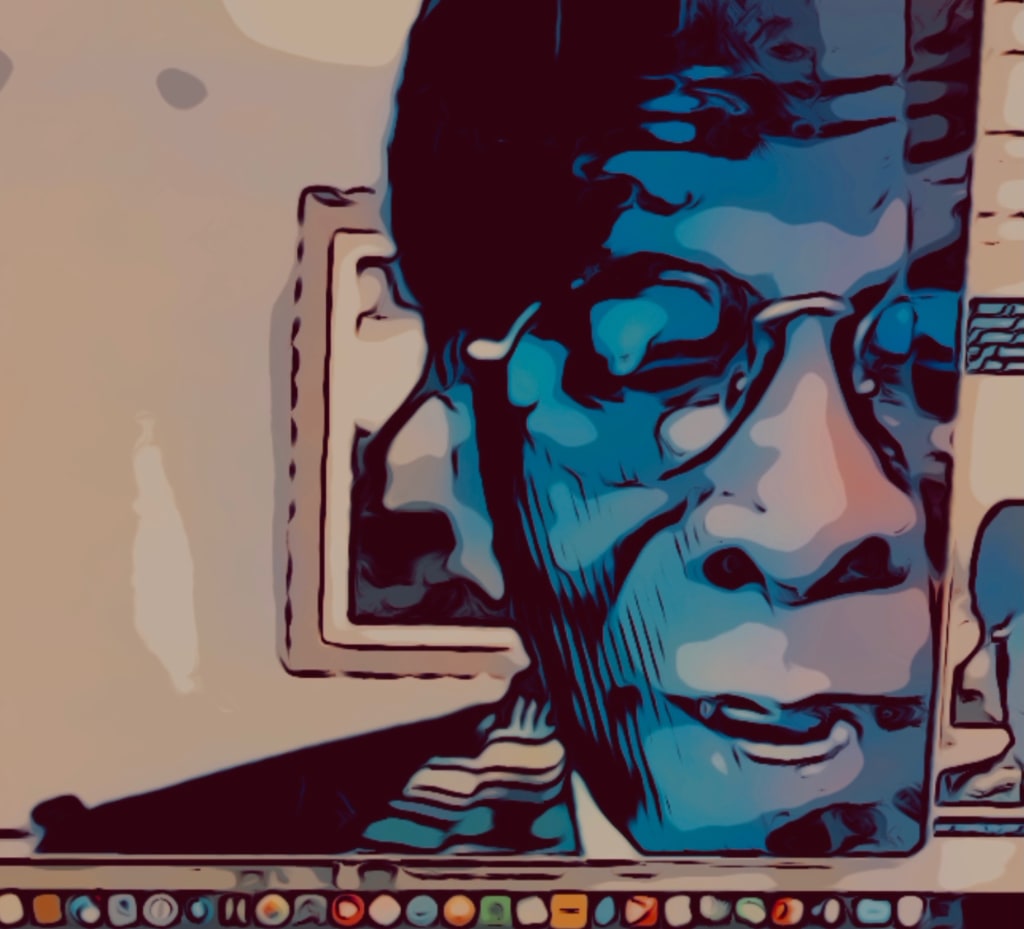Herbert Woodward Martin: Good Poems to Sell
A Tribute to Martin and Patrons Big and Small of the Arts

Herbert Martin has “Good poems to sell.” His latest collection, The Shape of Regret ($16.99, Wayne State UP), includes this line spoken by the ghost of poet Edith Sitwell, perched “on her pinnacle/far from hell.” Maybe she’s just “Outside the Gate,” the title of another poem, where the speaker says, “I no longer hope to get to heaven./I want a chair placed outside the gate;/that will do.”
That’s a lot of eternity for a book Amazon tells me will take an hour and a half to read, 18 cents per minute. And, though I did first read this delightfully varied collection of poems back-to-back, doing so is like drinking a row of shots, beginning with resonant nature imagery, then witticism, ode, spiritual, guffaw, 21-gun salute, kissing, and compline.
Martin’s poetry demands time in the reading. That 18 cents per minute becomes an infinite 3.333333 scents per second. That is, when the poems are read aloud, strengthened rather than diffused in air. Poets too demand time in their developing, as both poem and poet aspire to timelessness. This rare achievement requires community patronage—spelled m-o-n-e-y, less sordid than sacred.
In February, Martin spoke to my community college English class, his granddaughter Athena at his side. (Martin gave me permission to write about and share his work.) He zoomed in from his home office wearing his signature Kente cloth scarf, a gift made by a student’s grandmother. Born in Alabama in 1933, Martin is approaching his ninth decade, so he’s a member of the Silent generation, the one that in the Civil Rights movement was anything but.
Martin moved away from Birmingham at age 12: “My dad got a letter from his sister saying ‘Come North. You can make $5 a day, instead of $5 a week,’ so he left and came to Ohio. My mother, a month later, followed him at Christmas time.” By new year Martin too got on the train: “The black conductors took care of especially kids who were traveling by themselves, and one came in and said, ‘We've just crossed the Mason Dixon line.’ I mumbled to myself, ‘and that's that.’ I have never gone back to Birmingham, so make of that what you will.” The North, however, required that he learn to negotiate more subtle racism. He had to read between the want-ad lines: No, that church did not want a Black choir director. (Martin is also an accomplished chorister and librettist.)
But recently, all these years later, he awoke shocked that he had dreamt of Birmingham’s Bull Connor, the city’s infamous commissioner, which inspired a new poem “The Fire Hoses” (transcribed from the video): “The fire hoses were filled with cold water. And those who had survived such an incident said there was ice in that water because their bodies had been pummeled and had bled or were sore in spots . . ..That same water could send you up against the wall or send you skirting or swimming down the street. Your blackness had been warned. No talking back, no praying, and certainly no singing.”
In his work, Martin talks, prays, and sings a history, both personal and cultural, imbued with humor and regard for his fellow poets. Many poems in this collection are inspired by diverse artists: Lucille Clifton, Charles Ives, Hart Crane, Wallace Stevens, Wendell Berry, and others. Martin masterfully roasts William Carlos Williams the way only a true friend from across the page could. References to Martin’s mother also echo in this collection as much as they did his interview.
He described for students a moment of his mother’s tough love: “Once I was working at the post office in the winter time, so that I could pay for the [tuition] that was coming up, and it was minus zero. So I got on the phone with my mother, and said, ‘It's below zero. My toes and my hands will not move. I am freezing to death.’ She said, ‘What do you want me to do about that’? And she had a little sermon, she took a text, rain or shine, blah blah blah. I was so angry with her that by the time I hung up the phone [banging it] bang bang bang, the blood in my body began to move.” He said he worked all that day, and didn't feel any more pain. Years later, he thought, “If my mother had said, ‘Come home, my house is warm. You have a place in my house,’” he laughed, “I would have stayed at my mother's house forever.”
Martin emphasized the importance of another piece of his mother’s wisdom: She said, “‘Make your friends early on in life when they don't have power, when they don't have riches, when they don't have money, and they will stay with you forever.’ I tried to follow that edict . . . so along the way I’ve had remarkable friends and remarkable teachers.” Martin also put himself in the way of his prominent poetic contemporaries, however brief the overlap in time. He spoke of attending a reading of Langston Hughes set to jazz in college. He described how when he’d visit a new town, he’d learn where the poets lived, and show up at their doorsteps. He met W.H. Auden this way, padding around in his slippers, the same footwear his fellow poets said Auden wore to readings because of sore feet.
He described how poet Allen Tate once attended one of Martin’s poetry readings and advised him afterward to get himself “an old guy,” which at the time confused him. But a few weeks later he saw poet and novelist Margaret Walker read Paul Laurence Dunbar’s poetry. (Mmhmm. Margaret Walker. Reading Dunbar. Martin’s wife Sue says his good fortune warrants him a lifetime of coffee without cream or sugar.) It was there he realized what Tate meant, so Martin chose Dunbar as the artist around whom to build his scholarship. Over his career, Martin studied, collected, edited, and less impersonated than embodied Dunbar, parting his own hair, donning a smart suit and tie as Dunbar did. Martin has read Dunbar's works for years longer than Dunbar, who died at the age of 33, got to live, much less write.
Listening to Martin’s stories, I jealously wanted to transport into his memories, to capture the extraordinary moments from his generation, now being lost, accelerated by the pandemic. It reminded me of John Updike’s poem “Perfection Wasted,” the preemptive nostalgia for the loss of one’s “brand of magic.” Yet, while anyone can have a brand, the magic is more intense in those who are graced by some quality others lack. In Martin it’s a sort of gritty ambition cloaked in dignity. It’s the poise of a long-time churchgoer who knows he is a child of God, so he’s decided to act like one, incarnating the humility and fearless grandeur simultaneously.
Martin learned much from what was grand in others. He spoke of his college literary reading: “It was as if a poet was shooting an arrow right into the heart of the thing, so we knew that that particular writer was a genius who saw many, many things that allowed him to write that perfect line.” It was with this reverence that his fellow university students pored over new poems: “Somebody would be reading, say ee cummings, and they would come running down the hall to show a particular poem or a particular phrase. We would wonder how in the world the poet managed to write that image. We would mull it over for months because it was so interesting and clever too.”
As he spoke, I remembered my parents talking about the release of the Beatles’ Sergeant Pepper album. Through open dorm windows they heard a cacophony of the record on many turntables: Rita and Lucy and the band scrimping and saving to rent their cottage on the Isle of Wight. There was a contagious joy in shared, but curated cultural artifacts then. In the days before virality, only excellence or tragedy broke through to everyone at the same time.
How did Martin develop his own excellence in a world that didn’t expect it, worse outright stifled it, railroading young people into particular paths? In “The Fire Hoses” poem the lines he gives speaker Bull Connor include “Go to the supplied schools given you. Learn to cook and clean.” Even neighbors sometimes discouraged his college ambitions. Someone said to him, “‘You had better get yourself a broom and a mop like me and join the club.’” Martin continued, “I thought to myself that there must be something better than that, and so I struggled on.”
Martin wrote in a follow-up email answering a student question: “I might have once upon a time been susceptible to the idea that I was not as good as, but that idea did not last long in my mind. Somehow, I knew I was talented and that I could develop that given talent” which, he underscored, required hard work. As my long-ago professor, Martin sent us scavenging to the library during class to discover differences among the quartos, dated versions, of Hamlet without consulting reference works. We returned to breathlessly report. And he listened, smiled, knowing all the answers, including how to carve out some free time while illustrating that the learning is in the struggle. As a child in Birmingham, the segregated school system had more Black writers in the curriculum than in Ohio, where he didn’t see them included until beginning The University of Toledo. This education, his mother’s influence, and his own bright light allowed him see himself as an artist.
Yes, now countless Black artists have developed their talents against the odds. Pioneers like Paul Laurence Dunbar created their timeless art, but ‘old guys,’ his moneyed patrons, brought him his deserved renown. In other words, the cultural debt owed for Shakespeare’s genius had its interest paid by Queen Elizabeth I, King James, and the Earl of Southampton. Imagine if Jeff Bezos and others who profit from the arts would also prioritize giving back to them.
For it is the giving, the sustaining, that helps make the art. Martin was not, did not have to be, a poet entrepreneur. Few poets have ever made their living from their published works alone. But beyond that, he did not have the rough and tumble scramble of contemporary Black poets, who live by the give but also take, take, take of Internet labor, which requires as much facility with binary code as iambic pentameter. A path as freeing—You can make your life!—as it is exhausting. Who will help? The immediate community, yes, other artists, but also those who value them beyond measure: committed patrons.
In our time patronage means individual (that’s you), institutional, and corporate wealth engaged in a community. In Dayton, Ohio, the global corporations have mostly departed, leaving a vacuum of arts support. Now the dominant area employers and arts supporters are institutions: Feds, Meds, and Eds. But even the Eds are beginning to falter. This summer will bring planned faculty layoffs at Wright State University and budgetary woes plague The University of Dayton, where Martin spent his career. This essay too is underwritten by my full-time faculty salary at Sinclair Community College, an increasing rarity in an era of rampant academic wage inequity.
My first memory of Martin was paid for, but given freely. He was dressed as Dunbar, reading his works in the gymnasium of my Dayton public arts high school. At the same show, Dayton Contemporary Dance Company’s Sheri “Sparkle” Williams danced to the music of dialect, Dunbar’s poem, “When Malindy Sings.” Those words, those bright costumes and fluid yet controlled movements, they honored and preserved while making new. The event was probably supported by corporations, arts and educational organizations, the support that’s given the city the glorious abundance of two dance companies, an orchestra, an opera company, and many fine art, theater, and music venues. These and other arts organizations have struggled during the pandemic, but they are a vital for all those who need art, for virtuosos like Herbert Woodward Martin grow from childhood, and their first songs are always heard and supported at home.






Comments
There are no comments for this story
Be the first to respond and start the conversation.